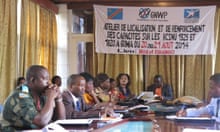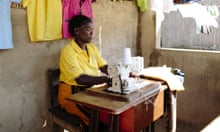As we approach International Women’s Day – now in its 25th year – there’s a lot to celebrate: women’s rights have risen up the political agenda over the last two decades (helped in part by MDG3), many countries have made progress towards eliminating gender disparity in primary education and we are also seeing the introduction of initiatives to ensure representation of women within senior political and corporate spheres.
But there’s still a long way to go. Despite the increasing recognition that gender equality is crucial to a nation’s social and economic development – as emphasised by the latest UN Women campaign – the myriad links and feedback loops between gender parity and development still need to be fully explored. In particular, what does a fluctuating economy mean for women, their empowerment and welfare? And how does – or should – this affect economic policy decisions?
This is particularly important as the world moves towards defining the sustainable development goals and wider post-2015 development agenda. While the proposed inclusion of a standalone gender goal is undoubtedly a cause for celebration, the more important task will actually be ensuring its integration across all of the other SDGs.
The latest UN Women world survey report highlighted how women and girls are disproportionately affected by social, economic and environmental shocks – a finding backed by Plan and the Overseas Development Institute in their 2013 report. More recently, my own research in Kenya looked at the extent and direction of crisis-induced changes in vulnerability in the turbulent years between 2007 and 2009 when the country faced what could be called a quadruple crisis: a political crisis, an oil and food crisis, a long-lasting drought and the global financial crisis.
Using a model to distinguish between different types of employment (self-employed, permanent employment, unpaid work), along with notes from in-depth household interviews, I tried to untangle the different drivers that motivated women to choose particular occupations at different points in time.
The results are startlingly clear: women are disproportionately and negatively impacted by economic shocks. They are forced to engage in undesirable jobs – including ‘informal’ jobs in the sex industry – to make up for the loss of income caused by the economic downturn. This is on top of normal household tasks, of which women tend to bear the brunt. The literature on the subject stresses the existence of a pervasive “stickiness” when it comes to substituting male and female labour for a range of domestic activities and this certainly seems to be the case in Kenya.
The outcomes were the same regardless of the level of empowerment experienced by women. Applying an empowerment indicator (based on attitudes towards domestic violence) revealed that while, before the crisis, relatively more empowered women were able to avoid the most undesirable jobs, during times of shock they found themselves obliged to carry out any available income-generating activity as part of their household’s coping strategies.
Disparity between women and men characterises most spheres of society in Kenya, and, arguably, most other countries. But the fact that these imbalances are emphasised during times of economic instability has a number of important implications for policy-makers.
To date, most policy responses to the global economic crisis have focused on financial-sector recovery and boosting jobs without accounting for unbalanced impacts on welfare at the household and community level. If we are to ensure that interventions are sustainable, policies aimed at stimulating economic recovery must be tailored to be gender-specific and account for women’s vulnerabilities.
There are encouraging signs – at Oxford Policy Management we’re currently evaluating the financial sector deepening initiatives that form part of DFID’s multi-year Poorest States Inclusive Growth Programme (PSIG) in India. The programme is piloting a range of activities aimed at supporting financial inclusion by empowering women to access finance sources that could help cushion against shocks and stresses.
It’s key that gender-based initiatives are seamlessly integrated into central policy-making processes. As Melissa Leach from the Institute of Development Studies notes, gender equality and sustainability can actually help reinforce each other given the right conditions. However, when simply added on as an after-thought or singled out as flagship policies, gender-based initiatives are less likely to have a positive and sustained impact. We need to ensure that the ‘invisible’ effects of the economic crisis are not just made visible, but are brought into the mainstream of the development debate.
Michele Binci is a consultant at Oxford Policy Management and author of The Gender Impact of Multiple Crises in Kenya







Comments (…)
Sign in or create your Guardian account to join the discussion